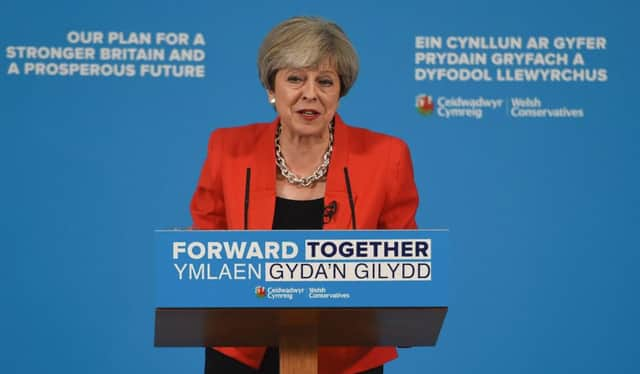A new devolution challenge arises from general election vote


By ruling out a second independence referendum until the Brexit process has “played out”, the UK government has effectively guaranteed the logjam in Scottish politics will continue until one side gives up or loses an election.
After 8 June, the next one of those is in 2021.
The great shame isn’t just that rows over independence will drown out debates on Scottish public services and the economy. It clearly will distract from those issues, although if the audience contributions during the BBC leaders’ clash on Sunday are anything to go by, Scotland’s politicians aren’t going to be allowed to forget their real responsibilities.
Advertisement
Hide AdAdvertisement
Hide AdIt’s that rows over referendums will also distract from a more nuanced evaluation of how devolution is and isn’t working.
If the Tories win next month, that conversation will have to start taking shape for a number of reasons. The first is Brexit.
When the SNP cried foul over the effect leaving the EU will have on the Scottish Parliament and its power, it was met with ridicule from political opponents and certain sections of the media.
Nicola Sturgeon claimed Brexit would “fundamentally undermine the basis of the existing devolution settlement”. Bombastic, perhaps, but there was a kernel of truth to her complaint – EU powers in devolved areas like agriculture won’t be returning to Scotland “automatically”, as promised by the Leave campaign in the shape of fishing minister George Eustice.
It’s now clear that the UK government will have to reopen the Scotland Act, not only to devolve as yet unknown new powers to Scotland, but also to tweak the list of reserved matters.
The second reason will be political. With the Conservatives in opposition at Holyrood, and the likelihood of a caucus of Scottish Tory MPs at Westminster rather than just the lonely Mr Mundell, the next Tory government is going to have a very different relationship with devolved Scotland than the one we’ve come to expect.
How different is spelled out in Theresa May’s manifesto. It accuses previous governments of working under a policy of “devolve and forget”, avoiding contact with responsibilities passed to Edinburgh or Cardiff as if they were a live wire.
If the Conservatives win next month, that will change. “We want the UK government to be a force for good across the whole country. So we will be an active government, in every part of the UK,” the manifesto says.
Advertisement
Hide AdAdvertisement
Hide AdCrucially, it says that while the UK government will work with devolved administrations, “that will not be the limit of our actions in the four nations”.
What will that look like? There is a hint in the Prime Minister’s Plan for Britain, a document that hides ignored behind strong and stable election slogans and a largely uncosted manifesto.
As a blueprint for a new UK industrial strategy for the UK, the plan is a key element of Mrs May’s ambition to respond to the working-class votes that delivered Brexit. In it, the government has posed some serious questions of the way the state interacts with the economy across the country, not just in England.
The document was criticised as a mash-up of pre-existing policy and nebulous aspiration. But in some places, the direction of travel is clear, and quite bold.
On skills in particular, Mrs May is proposing to effectively rip up the further education system in England and start again, building a stripped-down system with 15 routes for students that feed directly into key industries.
It sounds a lot like the German model of vocational education, which gives parity of esteem to learning a skilled trade and gives business a big stake in how courses are taught, meaning better paid jobs are guaranteed at the other end of a college education.
Re-shaping the economy around that kind of skills pipeline isn’t something that you can do on a piecemeal basis, nor would you want it to. If Mrs May succeeds, it could go a long way towards rebalancing the UK economy away from its reliance on services, boost productivity and reverse the growth trend in low-paid work.
That isn’t something Scotland can or should be excluded from. UK ministers regularly denounce the sluggishness of the Scottish economy, amid claims that Scotland has missed out on years of growth compared with the rest of the UK since the recession.
Advertisement
Hide AdAdvertisement
Hide AdIf those concerns are more than just rhetoric, then nor should Scotland be allowed to miss out on reconnecting further education with the economy.
It scarcely seems possible to deliver on the aspiration without some level of cross-border co-operation. The Scottish and UK governments should be ready to reach an accommodation about how that system can work across the country.
It feels as if it is sometimes forgotten how young the Scottish Parliament is. With only 18 years under its belt, the first generation to grow up never having known a Scotland without full control of the core components of its society is only just reaching adulthood.
Attitudes towards these things can change.
There were two generations who knew nothing but the UK in the EU, but that wasn’t enough to prevent the loss of all the advantages they came to expect.
With questions hanging over the Scottish Government’s stewardship of education, the economy, health and the police, the danger is that people begin to wonder what they have gotten out of two decades of devolution.
There will need to be answers to those questions when they come. If the question of independence can be dispensed with, then the search for those answers needs to begin.